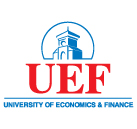THE FACULTY OF LAW EXPANDS KNOWLEDGE ON THE LEGAL FRAMEWORK AND BUSINESS CONDITIONS...
THE FACULTY OF LAW EXPANDS KNOWLEDGE ON THE LEGAL FRAMEWORK AND BUSINESS CONDITIONS FOR REAL ESTATE IN THE UNITED STATES FOR UEF STUDENTS
With the goal of providing students with practical and in-depth knowledge of international law, particularly in the field of real estate, the Faculty of Law at UEF organized a workshop titled “Legal Framework and Business Conditions for Real Estate in the United States” on the morning of December 15th. The program attracted significant interest and enthusiastic participation from many students in the Faculty of Law, especially those majoring in Economic Law.
The program welcomed the participation of numerous students from the Faculty of Law.
Accompanying UEF students in this workshop were seasoned experts with extensive practical experience in international legal and real estate investment fields, including Ms. Megan Cung – Quality at Seabed Geosolutions, Mr. Danny Duy – Global Attorney, and Mr. Tuan La – Partner and Founder of La Tax & Accounting LLC.
On behalf of UEF’s Faculty of Law, the workshop was attended by Prof. Dr. Dương Anh Sơn – Dean, Dr. Nguyễn Thị Thu Trang – Vice Dean and Director of the U.S. Law Center, and M.A. Nguyễn Nam Trung – Assistant Dean and Deputy Director of the U.S. Law Center.
The speakers addressed critical issues in the legal profession, with a particular emphasis on professional ethics.
At the outset of the session, the experts provided UEF students with an in-depth analysis of the U.S. legal framework governing property ownership and real estate transactions by foreign individuals and entities. Students were thoroughly informed about the mandatory requirements, rights, and obligations associated with investments in this sector. The speakers specifically highlighted the legal obstacles and compliance mechanisms concerning state-specific regulations, which often diverge significantly from federal law. This discussion underscored the necessity of acquiring a comprehensive understanding of applicable laws before engaging in international markets.
The intricacies of the U.S. tax system pertaining to real estate investments garnered significant attention, with students raising numerous inquiries and discussing practical case scenarios. Speaker Megan Cung elaborated on property tax, a recurring annual levy imposed based on the assessed value of real estate. This financial obligation is a pivotal consideration for foreign investors holding assets within the U.S.
The experts shared insights into their professional experiences and discussed trends in the U.S. real estate market.
Additionally, the speakers delved into the topics of Rental Income Tax and Capital Gains Tax. Regarding Rental Income Tax, the experts pointed out how to calculate taxes and the legitimate expenses that can be deducted to minimize tax liability for investors. Specifically, for Capital Gains Tax—applicable when transferring real estate and realizing profits—Mr. Tuan La shared various solutions to optimize transaction costs while ensuring effective legal compliance. This information has enhanced students’ understanding of these crucial tax types and the financial strategies needed for international investment.
The global career trends in the context of international integration are highlighted
A notable highlight of the program was the discussion on tax deferral processes through policies like the "1031 Exchange," a mechanism that allows investors to sell a property and reinvest in another property of equal or greater value to defer the payment of Capital Gains Tax. Mr. Danny Duy provided a detailed analysis of the conditions and benefits associated with this approach, helping students recognize smart financial strategies for long-term investment.
Through the sharing and in-depth analysis provided by the experts, students not only gained foundational knowledge of the legal and tax aspects of the real estate business in the United States but also had the opportunity to engage with real-life scenarios through specific examples. The sharing of experiences in handling difficulties, managing risks, and strategic investment planning shared by the professionals offered valuable lessons. It is evident that the workshops at UEF have broadened students' practical understanding of the industry, equipping them with essential skills to confidently enter the global workforce.


